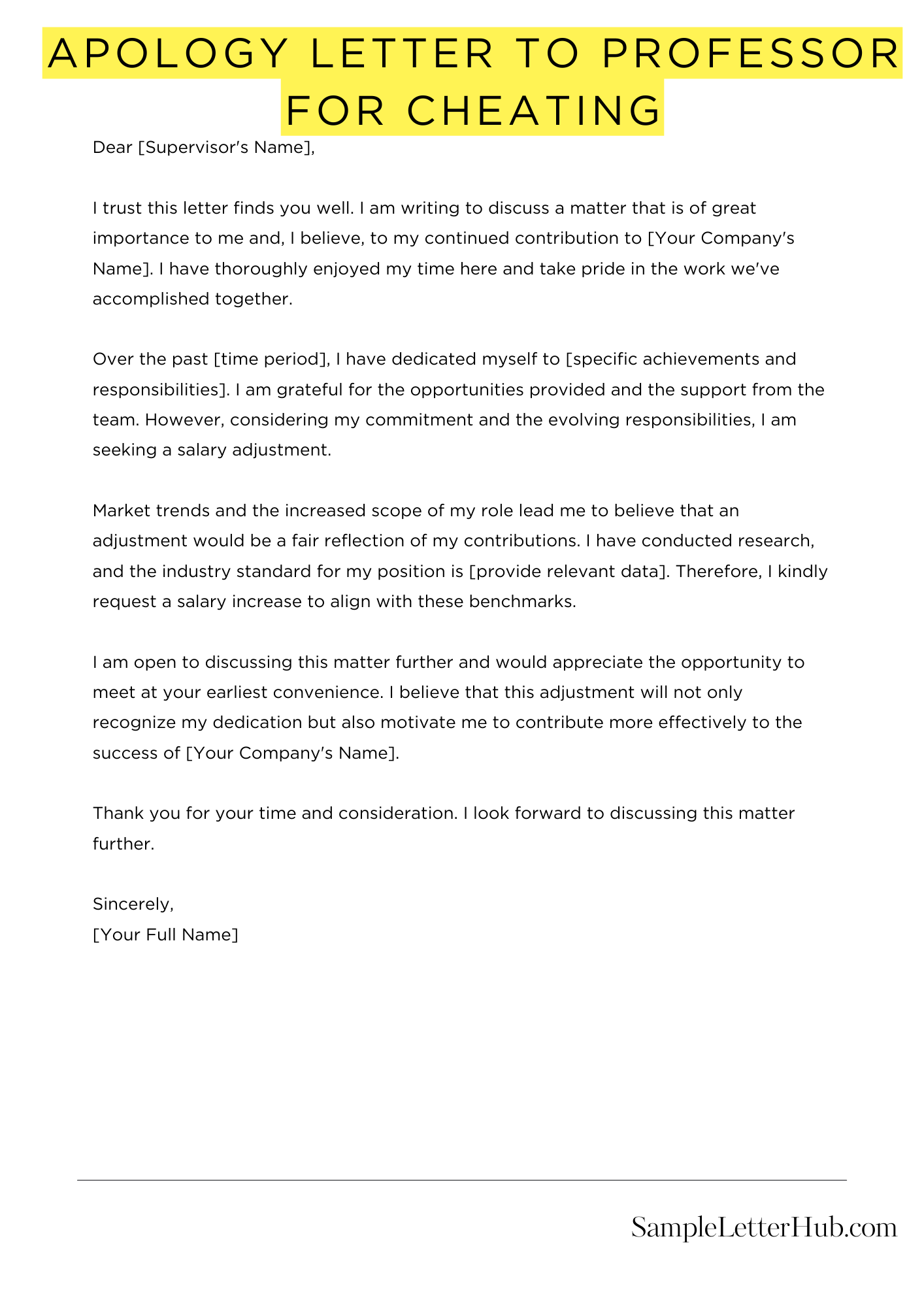An apology letter to a professor for cheating is a formal letter written by a student to express regret and apologize for cheating in an exam or assignment. The purpose of this letter is to acknowledge the wrongdoing, take responsibility, and seek forgiveness from the professor.
In this article, we will provide you with several apology letter to professor for cheating examples and samples. These examples are designed to help you craft an effective and genuine apology letter that can help you mitigate the consequences of your actions.
Remember, honesty and sincerity are crucial in writing an apology letter. Take the time to reflect on your actions, understand the impact of cheating, and express your genuine regret.
Apology Letter to Professor for Cheating
Dear Professor [Professor’s Name],
I am deeply sorry for cheating on the recent [Exam or Assignment Name]. I know that my actions were wrong and that I have violated the trust that you have placed in me.
I have no excuse for my behavior. I was under a lot of pressure to do well in your class, and I made a foolish decision to take a shortcut. I know that this was a serious mistake, and I am truly sorry.
I understand that I have disappointed you and my classmates. I have also damaged my own reputation. I am committed to rebuilding the trust that I have lost, and I will do everything in my power to make things right.
I am asking for your forgiveness. I know that I do not deserve it, but I hope that you will give me a second chance. I am confident that I can learn from my mistake and become a better student.
Thank you for your time and consideration.
Sincerely,
[Your Name]

How to Write an Apology Letter to a Professor for Cheating
Cheating is never the answer, but if you find yourself in the unfortunate position of having to apologize to a professor for cheating, it’s important to do so in a sincere and professional manner.
1. Start with an Apology
The first step is to start your letter with a clear and concise apology. Be sure to state that you are sorry for cheating and that you understand the seriousness of your actions.
2. Explain Your Circumstances
Once you have apologized, you may want to briefly explain your circumstances. This is not an excuse for cheating, but it can help the professor understand why you made the decision to do so.
3. Take Responsibility
It’s important to take full responsibility for your actions. This means acknowledging that you cheated and that you were wrong to do so.
4. State Your Commitment to Honesty
Let the professor know that you are committed to honesty and integrity in the future. Explain that you have learned from your mistake and that you will not cheat again.
5. Request Forgiveness
While you may not expect the professor to forgive you, it’s important to ask for forgiveness. This shows that you are truly sorry for your actions and that you hope to rebuild trust.
6. Offer to Make Amends
If possible, offer to make amends for your cheating. This could involve retaking the test or assignment, or completing additional work.
7. Close with a Sincere Apology
End your letter with a sincere apology and a statement of your commitment to honesty and integrity. Thank the professor for their time and consideration.
FAQs about Apology Letter To Professor For Cheating
1. How should I start an apology letter to a professor for cheating?
Begin by expressing your sincere regret and acknowledging the seriousness of your actions. Clearly state that you understand the consequences of your behavior and that you take full responsibility for your choices.
2. What should I include in the body of the letter?
Explain the reasons behind your decision to cheat, but avoid making excuses or blaming others. Focus on your own accountability and demonstrate that you have learned from your mistake. Outline the steps you have taken to prevent such behavior in the future.
3. How should I end the letter?
Reiterate your apology and express your hope for forgiveness. Request an opportunity to discuss the matter further and demonstrate your commitment to academic integrity. Thank the professor for their time and consideration.
4. What tone should I use in the letter?
Maintain a respectful and professional tone throughout the letter. Avoid being overly emotional or defensive. Instead, focus on conveying your sincerity, remorse, and determination to improve.
5. Should I include any supporting documentation?
If appropriate, you may include supporting documentation, such as a statement from a therapist or counselor, to provide context or demonstrate your commitment to change. However, ensure that the documentation is relevant and does not attempt to justify your actions.

